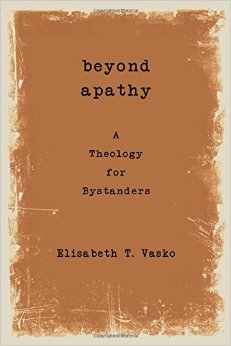The following is an invited guest post by Andrew Skotnicki, who is Professor and Chair of the Department of Religious Studies at Manhattan College, and whose primary research interest is the theological and moral foundations of criminal justice. His books include Criminal Justice and the Catholic Church (Lanham, MD: Sheed and Ward, 2008) and Religion and the Development of the American Penal System (Lanham, MD: University Press of America, 2000), and his newest book, The Last Judgment: Christian Ethics in a Legal Culture, will be published in March 2012 by Ashgate.
I have read with interest the statement by Professor Jürgen Moltmann and the responses that it provoked and am very impressed with the knowledge of the respondents and both the depth and sincerity of the conversation. To dispel any ambiguity about my own position, I believe that Moltmann is correct that retribution has no place in an ethic faithful to Christ; and I would add, in an ethic faithful to what we as members of the Catholic Church often have been and ought to be. To further dispel any ambiguity, I understand retribution to be the deliberate infliction by the state of punishment, specifically painful punishment (death in the case of Troy Davis) upon someone found guilty in a judicial hearing for disobeying the law.
The conversation stimulated by Moltmann’s statement, it seems to me, reflects two fundamental concerns: how can we be at the same time committed followers of Christ and committed Catholics, paying attention to what we believe God is telling us in the New Testament and what we believe that God is telling us through the tradition and teaching office of the Church. Let me assume that we agree that we do not wish to affirm any dualist notion that those terms are, at least in part, mutually exclusive, i.e. following Jesus is one thing and being Catholic is another.
If we agree with that assumption and believe that retributive punishment is morally legitimate, we have to argue that both the weight of New Testament ethical teaching (not a few specific passages) and Catholic tradition (not a few quotes from the catechism or some other authoritative document) does legitimate the infliction of violent punishment. If we believe that retributive punishment is not morally legitimate and also want to avoid being dualists, we have to argue that the weight of New Testament ethical teaching (not a few specific passages) and the weight of Catholic tradition (not a few quotes from authoritative sources) dispel any notion that we can willfully and morally do violence to another.
Since I have declared that the second option is the proper choice for us as Christians and as Catholics, let me offer my own explanation as to why the first position is not only unfavorable but leads precisely to the kind of dualism that we wish to avoid. First, the weight of the New Testament, not just the teaching of Jesus but that of Paul as well, favors mercy, forgiveness, and love over any form of retribution toward those who do us harm. One passage in Romans 13, (echoed in Peter and Timothy), which a litany of scripture scholars (e.g. Bornkamm, Kasemann, Luke Timothy Johnson) see as a reference to household ethics, is often given more ethical prominence than the Sermon on the Mount. It was Luther more than anyone else who used the passage to confer divinely legitimated violent power upon the secular realm.
Second, the history of the church, certainly before the twelfth century and, in many respects, after, features a wariness, if not fear, to bring harm upon the guilty. Recall that prior to the creation of canon law and its inquisitorial legal method (case and procedural law, a professional judiciary, law schools, trained lawyers etc.) all offenses were adjudicated under the adversarial system. There was no distinction between sin and crime. An offense was solely an offense against another and against God. With confession and mediated interchanges between the contending parties, the issue was resolved with no need to put people in prison (since there were virtually no secular prisons). However, with the institution of canon law (and, in its wake, secular legal systems), a third factor was brought into the equation. An offense, even if forgiven by a priest in confession, and brought to reconciliation between the parties involved, still had to be punished because the offender had broken the law. It marked a sad day in the history of the church when, by ecclesiastical decree, the absolution given in the sacrament of confession presumably bestowed forgiveness from God, but was insufficient to merit forgiveness from the church.
My argument is that ever since codes of law were established, a new source of moral accountability not only competed with the gospel but routinely trumped its authority. To avoid dualism, more and more of the integrity of the gospel had to be sacrificed to satisfy the demands of order and sanction the violence that must accompany legal systems to give them any authoritative legitimacy; and even quotes from the magisterium (e.g., Cat. 2266) had to be read as explicit affirmations of retributive punishment.
I am thus saddened to read someone of Cardinal Dulles’ stature as an intellectual say that to argue against retributive punishment is to argue against two millennia of Church history. Catholicism loses nothing of the best of its tradition by focusing on the restorative method of adjudicating offenses. It was the method utilized throughout the first eleven hundred years of the Church; it is at the heart of the legal minimalism in the teaching of Christ and St. Paul; and it is the method that Christ willed for us (Mt 18: 15-18). Speaking of Mt 18, the worst punishment the passage recommends for the recalcitrant is that we treat them like we would a Gentile or a tax collector, which means we love them, forgive them, encourage them, and perhaps take them out to dinner.




Andrew— Very nice, succinct response. I am especially apppreciative the careful handling of the question of where “the weight of the tradition” lies. It became apparent in previous discussions that this question of how to understand the tradition is necessary. Appeals to proof-texts (on either side!) tend to be misleading if one does not offer some overall reading of the tradition.
Tobias and Andrew,
Let’s go to tradition instead of proof texts and it ‘s not an area I like because it involved not criminals but heretics. According to Josef Blotzer’s essay on the Inquisition in the old Catholic encyclopedia, the execution of heretics was done by seculars of the empire on their own since heresy was treason. But starting in 1253, Popes made execution of heretics mandatory by seculars under pain of excommunication…Blotzer:
” The aforesaid Bull “Ad exstirpanda” remained thenceforth a fundamental document of the Inquisition, renewed or reinforced by several popes, Alexander IV (1254-61), Clement IV (1265-68), Nicholas IV (1288-02), Boniface VIII (1294-1303), and others. The civil authorities, therefore, were enjoined by the popes, under pain of excommunication to execute the legal sentences that condemned impenitent heretics to the stake. It is to be noted that excommunication itself was no trifle, for, if the person excommunicated did not free himself from excommunication within a year, he was held by the legislation of that period to be a heretic, and incurred all the penalties that affected heresy.”
Furthermore, Juan Antonio Llorente, General Secretary of the Inquisition from 1789 to 1801, estimated that 31,912 were executed, 1480-1808.
To see how many criminals were executed by the papal executioner, Buggatti, simply google the wiki piece on him…500 executed between roughly1800 and 1850.
Aquinas by the way used Romans 13:4 in favor of capital punishment several times in the Summa Theologica…see the question on vengeance.
So combining the above facts, we know that from 1253 til at least 1850, the Church believed in and exercized retribution for 600 years. Hell by the way is retribution in so far as it has been explained. One hopes there is an ever so slow medicinal aspect in the area of wisdom under suffering.